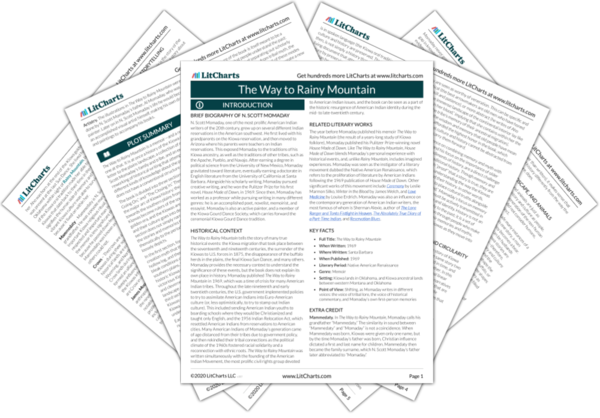The Kiowas Quotes in The Way to Rainy Mountain
In one sense, then, the way to Rainy Mountain is preeminently the history of an idea, man’s idea of himself, and it has old and essential being in language. The verbal tradition by which it has been preserved has suffered a deterioration in time. What remains is fragmentary: mythology, legend, lore, and hearsay—and of course the idea itself, as crucial and complete as it ever was. That is the miracle.

Unlock explanations and citation info for this and every other The Way to Rainy Mountain quote.
Plus so much more...
Get LitCharts A+The buffalo was the animal representation of the sun, the essential and sacrificial victim of the Sun Dance. When the wild herds were destroyed, so too was the will of the Kiowa people; there was nothing to sustain them in spirit. But these are idle recollections, the mean and ordinary agonies of human history. The interim was a time of great adventure and nobility and fulfillment.
There is a perfect freedom in the mountains, but it belongs to the eagle and the elk, the badger and the bear. The Kiowas reckoned their stature by the distance they could see, and they were bent and blind in the wilderness.
A hundred years ago the Comanche Ten Bears remarked upon the great number of horses which the Kiowas owned. “When we first knew you,” he said, “you had nothing but dogs and sleds.” It was so; the dog is primordial. Perhaps it was dreamed into being.
The Kiowa language is hard to understand, but, you know, the storm spirit understands it. This is how it was: Long ago the Kiowas decided to make a horse; they decided to make it out of clay, and so they began to shape the clay with their hands. Well, the horse began to be. But it was a terrible, terrible thing.
The falling stars seemed to imagine the sudden and violent disintegration of an old order.

The Kiowas Quotes in The Way to Rainy Mountain
In one sense, then, the way to Rainy Mountain is preeminently the history of an idea, man’s idea of himself, and it has old and essential being in language. The verbal tradition by which it has been preserved has suffered a deterioration in time. What remains is fragmentary: mythology, legend, lore, and hearsay—and of course the idea itself, as crucial and complete as it ever was. That is the miracle.

Unlock explanations and citation info for this and every other The Way to Rainy Mountain quote.
Plus so much more...
Get LitCharts A+The buffalo was the animal representation of the sun, the essential and sacrificial victim of the Sun Dance. When the wild herds were destroyed, so too was the will of the Kiowa people; there was nothing to sustain them in spirit. But these are idle recollections, the mean and ordinary agonies of human history. The interim was a time of great adventure and nobility and fulfillment.
There is a perfect freedom in the mountains, but it belongs to the eagle and the elk, the badger and the bear. The Kiowas reckoned their stature by the distance they could see, and they were bent and blind in the wilderness.
A hundred years ago the Comanche Ten Bears remarked upon the great number of horses which the Kiowas owned. “When we first knew you,” he said, “you had nothing but dogs and sleds.” It was so; the dog is primordial. Perhaps it was dreamed into being.
The Kiowa language is hard to understand, but, you know, the storm spirit understands it. This is how it was: Long ago the Kiowas decided to make a horse; they decided to make it out of clay, and so they began to shape the clay with their hands. Well, the horse began to be. But it was a terrible, terrible thing.
The falling stars seemed to imagine the sudden and violent disintegration of an old order.











